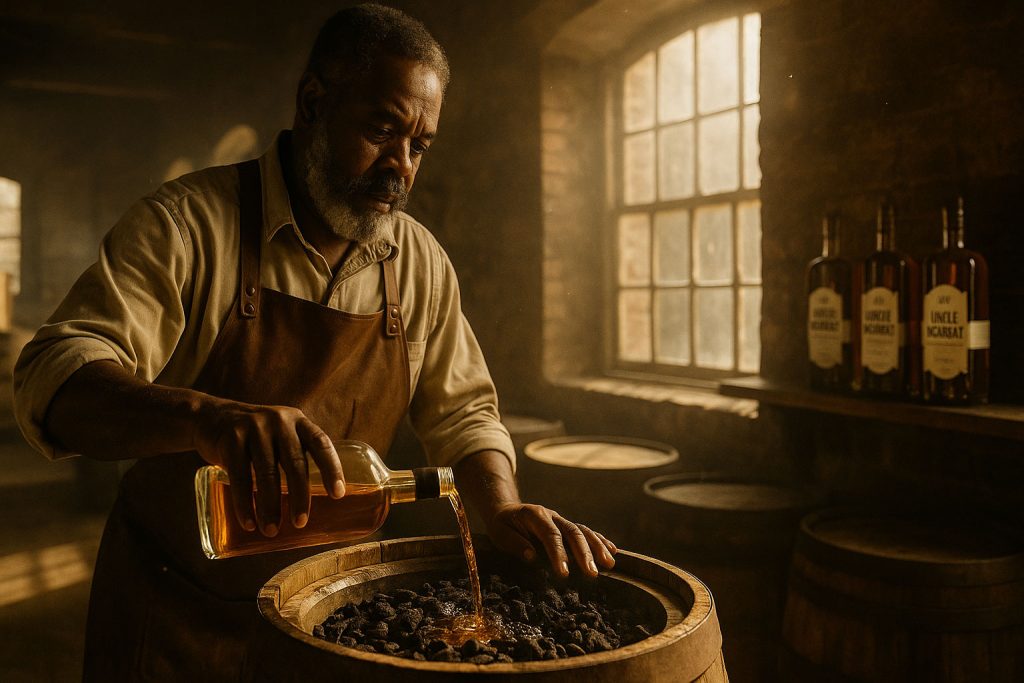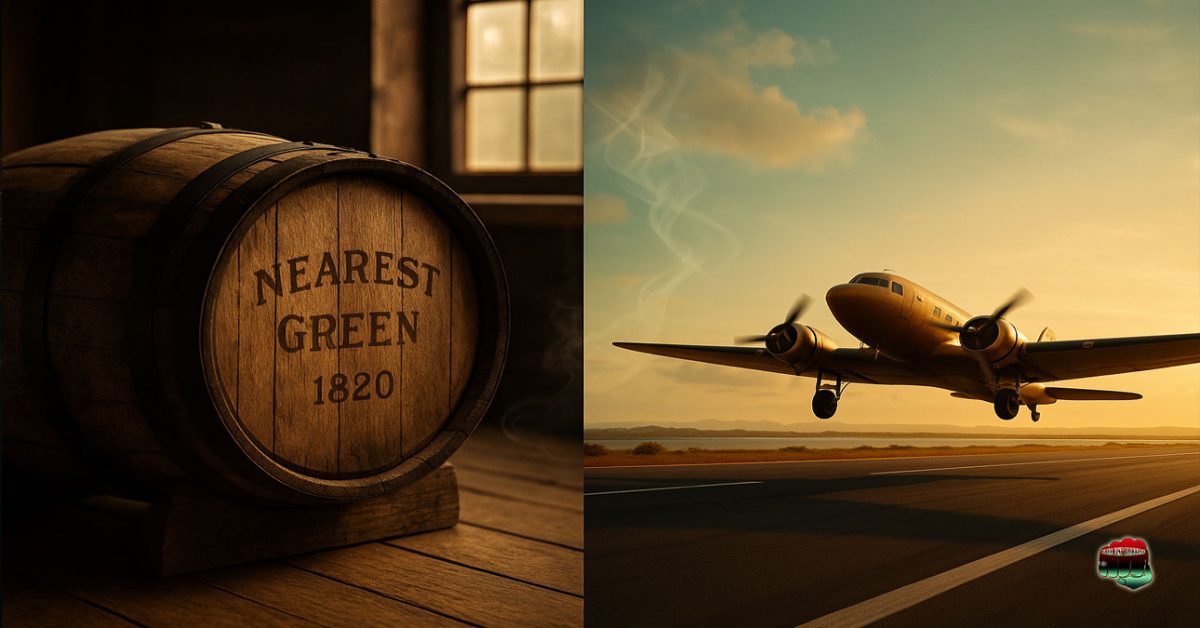By Kairos Reed | InnerKwest.com
October 31, 2025
The Erased Blueprint
Somewhere between the scent of oak barrels in Lynchburg and the hum of Cessnas over Detroit, an entire chapter of Black enterprise was wiped clean. The same steady hands that built runways and distilled excellence were quietly written out of the record. What history calls integration often functioned as a cleansing—an official amnesia that hid the people who first made flight and flavor accessible to those denied both.
Integration promised equality but delivered absorption. It asked Black excellence to dissolve into white comfort zones and called the process progress. In reality, many Black innovators watched the doors of opportunity open just wide enough for their ideas to be taken—and their names left behind.
The Distiller They Tried to Forget
Long before marketing turned whiskey into a Southern romance, a Black man named Nathan “Nearest” Green was perfecting the method that would define Tennessee’s signature spirit. Enslaved and later freed, Green taught a young Jack Daniel the charcoal-mellowing process that gives Tennessee whiskey its character. Yet for more than a century, his name never appeared on the bottle, the payroll, or the company history.

In 2016, author and entrepreneur Fawn Weaver stumbled on a footnote about a forgotten Black distiller. She followed it back to Lynchburg, Tennessee, sifted through courthouse records and oral testimonies, and uncovered a buried truth: the world’s best-known whiskey brand was built on the craftsmanship of a man America chose to forget.
Weaver did more than publish a revelation—she launched Uncle Nearest Premium Whiskey to center the truth. She built a distillery, a foundation, and a brand empire that became the fastest-growing independent American whiskey in history. In doing so, she forced Jack Daniel’s to publicly honor its first master distiller.
Her philosophy is simple: truth tastes better.
Each bottle poured re-balances a century of silence.
The Airlines That Vanished from History
While Nearest Green’s story aged in oak, another form of Black brilliance was buried in the clouds.
From the 1940s through the 1970s, small but determined Black-owned airlines and charter services dotted the American landscape: Wheeler Airlines in North Carolina; Sepia Airways; Johnson Flying Service with its Cessna fleet; Flamingo Airways and a Mohawk Airways that linked Caribbean islands when white carriers refused; maintenance facilities such as Central Airlines Hangar that kept those planes in the air.

These weren’t hobby projects—they were the backbone of a parallel economy built because segregation barred access to white-run airports and pilot schools. They trained Black aviators, moved Black business travelers, and proved that competence could soar without permission.
Then came integration. White-owned carriers that had ignored Black routes suddenly “discovered” them. Backed by federal subsidies and bank credit, they undercut prices and absorbed the airspace. FAA documentation quietly dropped the smaller Black operators from its registers. When researchers later searched for evidence, they found gaps big enough to fly a DC-3 through.
In the official histories of American aviation, these airlines scarcely exist. But they were real—certified, flying, and free until the market redefined freedom on someone else’s terms.
The Psychology of Erasure
Erasure is not only economic; it is psychological warfare.
When the archive omits a people’s achievements, it trains future generations to associate success with someone else’s face. It replaces memory with mythology. The message becomes: You were passengers, not pilots; laborers, not distillers.
The cost of that conditioning is self-doubt that spans generations. A child who never sees proof of ancestral genius grows up believing contribution began only after permission was granted. That’s how cultural power is neutralized—by convincing the mind to self-edit.
The Broader Pattern—Hospitals, Banks, Hotels
The cleansing of Black aviation and distilling fits a nationwide pattern.
- Black hospitals were merged out of existence during “integration,” stripping Black physicians of leadership roles.
- Black banks lost deposits when desegregation allowed Black customers to use white institutions that never reinvested in their neighborhoods.
- Black hotels and bus lines collapsed when white businesses finally accepted Black travelers.
Integration opened the door—but it also emptied the house.
The result was a transfer of capital, narrative, and credit. Black spaces that once demonstrated independence were rebranded as outdated, while their replacements claimed to be the new face of equality.
The Mechanics of Erasure
| Mechanism | Whiskey | Aviation |
|---|---|---|
| Hidden Architect | Nearest Green | Black founders & pilots |
| Institutional Silence | Corporate lore omitted him | FAA & trade journals ignored them |
| Market Absorption | Jack Daniel’s monopolized prestige | White carriers dominated routes |
| Recovery Agent | Fawn Weaver | Modern historians & researchers |
| Reclamation | Uncle Nearest Whiskey | Restored record of Black aviation |
The logic was identical: erase the source, claim the product, centralize the profit.
When names disappear, ownership becomes transferable. What was once communal heritage becomes private capital.
The Economics of Forgetting
Forgetting is expensive work. It requires curated textbooks, compliant historians, and compliant funding. Every missing page protects a revenue stream. Every silenced name secures an inheritance for someone else.
This is why remembrance itself is a form of resistance.
When Fawn Weaver placed Nearest Green’s name back on a bottle, she didn’t just tell a story—she reopened a closed revenue loop. When historians resurrect Black airline records, they challenge the legal fiction that those companies “never qualified” for protection or subsidy.
Erasure looks tidy in ledgers; restoration makes the balance sheet messy again. And that’s exactly what justice demands.
The Reclamation Wave
Today, Uncle Nearest is an international powerhouse—proof that acknowledgment can be profitable.
In the sky, Western Air Bahamas, founded by Captain Rex and Shandrice Rolle, stands as the largest Black-owned airline in the world, connecting routes once dismissed as unviable. New scholarship is emerging from community historians documenting Wheeler and other lost carriers.
Each rediscovery chips away at the myth that Black enterprise was marginal. It shows instead that Black vision was the prototype—and erasure the counterfeit.
Truth as Restitution
Every recovered name—whether etched on a whiskey label or logged in a flight plan—is a blow against the machinery of forgetting.
What was hidden was never gone; it was simply waiting for someone brave enough to lift the tarp.
History, after all, is not a neutral record. It is an arena of custody. Whoever controls the memory controls the meaning—and ultimately, the money.
Fawn Weaver’s distillery and the ghosts of those Black-owned airlines testify that remembrance can also be re-entry: a relaunch, a takeoff, a toast.
“Integration opened the sky,” as one elder pilot once said, “but it also closed the hangar doors.”
Those doors are reopening now, one truth at a time.
And the cleansing ends only when the story speaks for itself again.
Support InnerKwest: Powering Truth & Excellence with Bitcoin
At InnerKwest.com, we are committed to delivering impactful journalism, deep insights, and fearless social commentary. Your Bitcoin contributions help us execute with excellence, ensuring we remain independent and continue to amplify voices that matter.
Support our mission—send BTC today!
🔗 Bitcoin Address: 3NM7AAdxxaJ7jUhZ2nyfgcheWkrquvCzRm© 2026 InnerKwest®. All Rights Reserved | Haki zote zimehifadhiwa | 版权所有.
InnerKwest® is a registered trademark of Performance Platforms Global Inc.
No part of this publication may be reproduced, distributed, or transmitted in any form or by any means without prior written permission. Unauthorized use is strictly prohibited.
Thank you for standing with us in pursuit of truth and progress!![]()
Interested in Becoming a Guest Contributor for InnerKwest.com?
We welcome insightful and thought-provoking guest contributions on InnerKwest.com! If you have a unique perspective, compelling analysis, or well-researched commentary on social issues, we’d love to feature your work.
To submit a guest post or inquire about collaboration opportunities, please reach out to us at desk@innerkwest.com. We look forward to hearing from you!![]()

